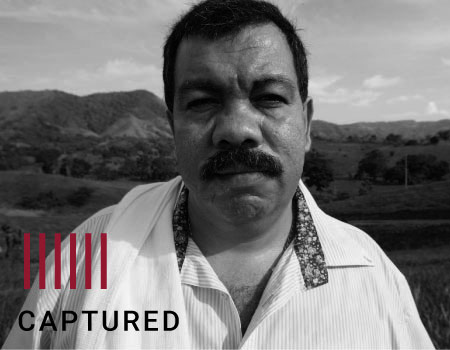Until his extradition to the United States in 2008, Diego Fernando Murillo, alias “Don Berna,” was the leader of the Oficina de Envigado mafia group, which grew from the ashes of Pablo Escobar’s Medellín Cartel.
History
Don Berna began his criminal career as a member of the Popular Liberation Army (Ejército Popular de Liberación – EPL), a small guerrilla group that was the starting point for a number of other high-profile members of Colombia’s criminal underworld, including the Rastrojos‘ Javier Calle Serna, alias “Comba,” and the Úsuga brothers Dario and Juan de Dios, of the Urabeños.
After leaving the EPL in the 1980s, Don Berna began working for the Medellín Cartel’s Galeano brothers, allied with Pablo Escobar. Their relationship with Escobar, however, changed in 1992, when he ordered the murder of Fernando Galeano – Don Berna’s boss – after suspecting he and his partner, Gerardo Moncada, were stealing money from their drug trafficking operations.
Don Berna decided to seek vengeance for Galeano’s murder. Along with paramilitary leaders Fidel and Carlos Castaño, he created the People Persecuted by Pablo Escobar (Perseguidos por Pablo Escobar – PEPES). A combination of criminal forces, the PEPES united rural paramilitaries, the Cali Cartel and corrupt elements of the Colombian National Police in an effort to take down Escobar once and for all. The PEPES were instrumental in the police’s work to track down and kill the kingpin in December 1993.
With Escobar off the criminal chessboard, Don Berna took over the drug trafficking enterprise Escobar had left behind in Medellín. He established a criminal governance model over the city’s street gangs, known as “combos”, demanding they give him a cut of their earnings in exchange for allowing them to extort, steal, and sell drugs. He also controlled the Terraza, which served as the Oficina de Envigado’s armed wing, and played a key part in ending the presence of guerrilla groups in Medellín.
In no time, Don Berna established a model that allowed him to profit from all the criminal economies in Medellín, earning him immense power and wealth.
He also deepened his ties to the United Self-Defense Forces of Colombia (Autodefensas Unidas de Colombia – AUC), and was a key player connecting the paramilitaries to drug trafficking. In the early 2000s, he created the Cacique Nutibara, which served as an additional armed wing of the Oficina de Envigado in Medellín.
In 2003, he demobilized from the AUC. However, criminal activities were far from over, and Don Berna continued to amass power. Through his control over gangs, he managed to reduce violence, causing homicide numbers in Medellín to plummet. This period of peace became known as “Donbernabilidad,” a cynical reference to the Spanish word for “governability.” Soon after his demobilization, he was arrested for allegedly ordering the murder of a politician in the department of Córdoba. In 2008, he was extradited to the United States on drug trafficking charges. In June of that year, he pleaded guilty to conspiring to import multiple tons of cocaine to the United States in a Southern District of New York court. Don Berna was sentenced to 31 years in prison. Since then, the Oficina de Envigado has fractured and lost a large part of its criminal reputation.
Criminal Activities
Criminal activities
Don Berna left a bloody legacy in the criminal underworld. In Colombia, he has been accused of murder, forced disappearances, forced displacement, child recruitment, gender-based violence, and other crimes.
Additionally, drug trafficking, taxing local gangs in Medellín for extortion, retail drug sales, and gambling, among others, earned him large amounts of money.
Geography
Despite Don Berna being from the city of Tuluá, in Valle del Cauca, his criminal headquarters were in the city of Medellín, Antioquia. However, the power he held over the city’s gangs allowed him to exert power beyond the city limits.
Allies and Enemies
Don Berna was known as a cold, calculating criminal who never made long-lasting alliances. He nurtured key relationships with military, police, and political elites at a local, regional, and national level, which was key for maintaining power over the Oficina de Envigado and Medellín’s gangs.
He personally ordered the murder of several of his one-time allies, including leaders of the Terraza and the AUC who challenged his authority. He helped plan the attempted murder of AUC founder Carlos Castaño, and is believed to have ordered the murder of rival AUC lieutenant Carlos Mauricio García Fernández, alias “Doble Cero.”
Prospects
Don Berna has little chance of returning to the Colombian criminal underworld. He will be almost 80 years old by the time he finishes serving time in the United States in 2039, and will face additional criminal charges in Colombia once he comes home.
In March 2024, Don Berna was cited by the Special Jurisdiction for Peace (Jurisdicción Especial para la Paz – JEP), the Colombian transitional justice court created after the government and the Revolutionary Armed Forces of Colombia (Fuerzas Armadas Revolucionarias de Colombia – FARC) signed a peace agreement in 2006. He was asked by the court to provide information on the links between security forces and the AUC.
Don Berna’s legal team has also sought his repatriation to Colombia, claiming he has health issues.

